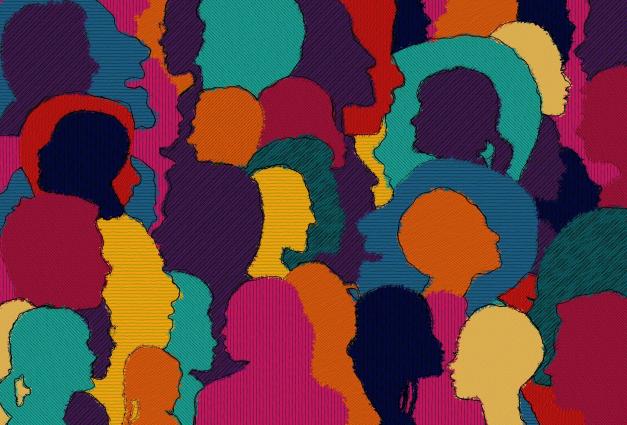The SPSP 2022 Presidential Plenary session featured four speakers who discussed why and how we must diversify personality psychology. In the spirit of ensuring that their important message reaches a wider audience, we decided to recap the session for those who were unable to attend the annual convention this year.
First, a quick run-through on what 1968 signifies to the field of personality psychology—1968 was the year Walter Michel published his book, Personality & Assessment. Mischel brought into question the usefulness of personality traits in predicting behavior, sending the field into an existential crisis and setting off the person-situation debate. Ultimately, it led personality psychologists to strengthen the methods and significance of their work. In the process, however, personality psychology, not unlike the larger discipline of psychology, became mostly white and most male. Dr. Laura King, the session chair, asserts that this crisis—the lack of a diverse personality science—is more pressing that the one that began in 1968. The invited panelists—Dr. Kelci Harris, Dr. Jonathan Adler, Dr. Samantha Heintzelman, and Dr. Robert Sellers—speak to the urgency of diversifying the science of personality, whether it be who conducts the science, or who participates in it.
Dr. Kelci Harris - Centering the Experience of Underrepresented Scholars in Personality Psychology
"I want to never forget that we are talking about people, not numbers."
Dr. Harris spoke about the added burdens that graduate students from underrepresented backgrounds often carry—not only do they engage in regular activities accompanying a graduate career, but they also shoulder the burden of making the field more diverse in our quest to fully integrate heretofore ignored aspects of identity into personality science. Students shouldn't have to do this while also navigating the often uncertain hallways of graduate school, without ample support.
Dr. Harris proposes three questions for faculty to ask themselves as they recruit and mentor students from underrepresented backgrounds:
- Am I bringing students into a place that is welcoming and affirming? Diverse viewpoints from minority students are not always welcomed. Mentors must be ready to prepare their students and provide support when this happens.
- How can I reduce students' uncertainty as they move through graduate school? Dr. Harris shares that her strategy is to lean into formality here, e.g. have open conversations about expectations so there are no ambiguities, provide detailed and constructive feedback, etc.
- How can I empower students to pursue their career goals after graduating? Mentors must help students pave a clear path to a fulfilling career and financial stability. This means creating opportunities for advisees to publish and present their work, and being proactive about incorporating experiences that would benefit students looking for careers outside academia.
Dr. Jonathan Adler - Diversifying Personality Psychology Inductively
"We're at a point in our field's history where we need to look beyond past the master narrative and revise it."
Dr. Adler began his talk by drawing parallels between the history of queer rights in the U.S. and the history of personality psychology during the same period of time. The redemptive arc of the modern gay rights movement excludes the contributions of Black people, not to mention how it coincided with the racial civil rights movement. Similarly, the master narrative of personality psychology ignores some important aspects—while personality science boasts of large nationally representative samples and methodological rigour, it has become rather limited in some ways.
Dr. Adler proposes that we can diversify personality science by making some changes in our methods and publishing process. He suggests:
- Increase the use of narrative methods that employ an inductive approach to understanding personality
- Collect samples that better represent the world across many axes
- Shift focus to Invest in research that describes phenomena
- Engage in efforts to integrate seemingly contradictory strands of research while also engaging in a proliferation of new ideas
- Revise publishing processes to encourage research that employs diverse ways of looking at topics that matter in the real world
Dr. Samantha Heintzelman - Personality Science: The Next Generation
"Personality science is relying on our affiliations with social psychology to satisfy our diversity, equity, and inclusion goals."
In the first part of her talk, Dr. Heintzelman pointed out the continued lack of representation from diverse groups that the field suffers from, despite the common perception that progress has been made. For example, among the SPSP membership, Black/African American members and Middle Eastern/North African members each makeup only 4% of the total membership, and Latino/Hispanic/Chicano/Puerto Rican members make up 5%. A similarly sobering picture emerges across personality publications—most first authors at flagship journals are white. It also appears that personality science adopts a position of race blindness—most articles (and posters at this conference) do not report the race composition of their samples, and where they do, most are white. It is high time we reckon with this lack of diversity and take intentional steps to open up the field.
Dr. Heintzelman went on to offer some recommendations on diversifying and sustaining personality science:
- Conduct research that matters to the real-world problems, contextualized in real-world settings. Students from underrepresented backgrounds are often motivated to do work that matters in the world they occupy, and as it stands, personality science is not perceived to readily offer this.
- In the classroom: Teach modern (not solely timeworn history) personality content and methods while making connections to what personality contributes to real-world issues
- In the lab: Make a committed effort to recruit, train and support students from a range of backgrounds, while creating space for them to be their full selves to the lab and honor their perspectives. In addition to this, she highlights the need for more paid research programs in personality labs.
Dr. Robert Sellers - Why Should Personality Science Care about Race?
"The reality is just about every bit of psychology is me-search."
Dr. Sellers emphasized the fundamental role that race played in the continued survival of personality science as a field. To date, the study of personality has been examined very narrowly, in terms of who is studied and who gets to do the studying. Therefore, if personality research is supposed to be about individual differences, variation, and behavioral attributions of individuals across the lifespan, the field has failed to live up to this goal.
The politics within the field restrict who gets to frame what personality is. Scholars such as Franz Fanon, William Cross, and Janet Helms, who all studied individual differences among African American lives are often ignored in what is considered "traditional" personality science. This ties in with another issue where work that is not considered "mainstream" personality is pigeonholed into niche topics like activism, diversity science, or culture, and thus excluded from a comprehensive understanding of the individual. One way to broaden our understanding is to actively engage with non-traditional sources to study the person, e.g. sociology, culture studies, history, etc. Dr. Sellers also cautioned against a one size fits all approach to testing theories—it removes much of what is crucial to understanding the experiences of the people we study.
On the topic of who gets to study personality—when students from minoritized backgrounds study topics that relate to their identity, their objectivity is brought into question. We need to recognize that all our research questions are in one way or another defined by our experiences. When we limit who gets to frame these questions, the science suffers. Unless we actively diversify the field in terms of students, language, and methods, we will never fully realize what personality science could be.




